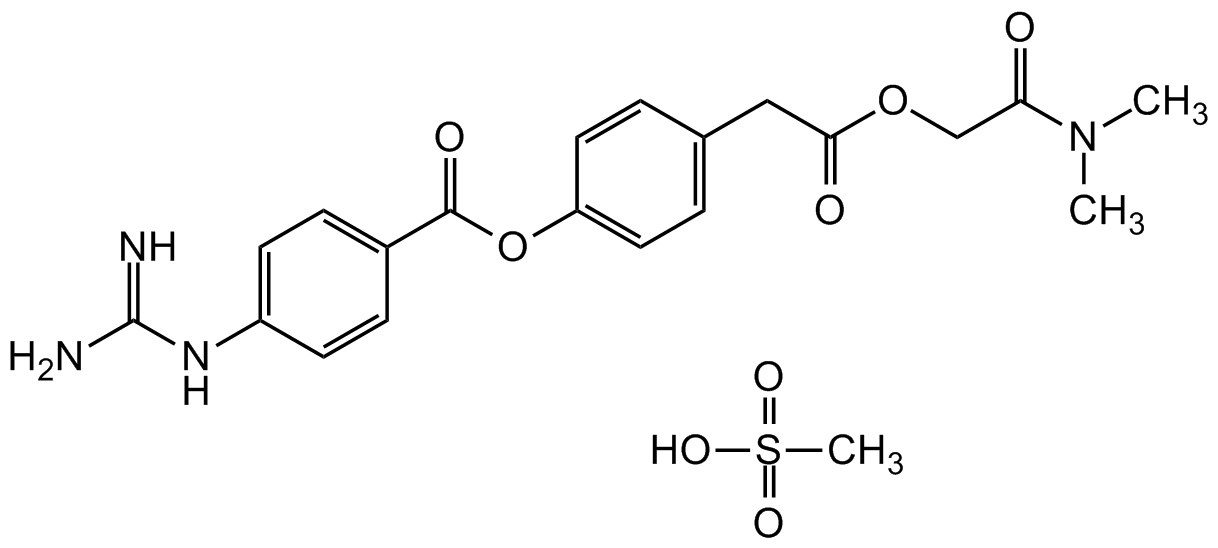
Chemical Structure
Camostat . mesylate [59721-29-8] [59721-29-8]
AG-CR1-3716
CAS Number59721-29-8
Product group Chemicals
Estimated Purity>98%
Molecular Weight398.4 . 96.1
Overview
- SupplierAdipoGen Life Sciences
- Product NameCamostat . mesylate [59721-29-8] [59721-29-8]
- Delivery Days Customer10
- CAS Number59721-29-8
- CertificationResearch Use Only
- Estimated Purity>98%
- Hazard InformationWarning
- Molecular FormulaC20H22N4O5 . CH4O3S
- Molecular Weight398.4 . 96.1
- Scientific DescriptionCamostat is an orally bioavailable trypsin-like protease inhibitor known to inhibit trypsin and various inflammatory proteases including plasmin, kallikrein and thrombin. Camostat has been shown to inhibit the production of TNF-alpha and monocyte chemoattractant protein-1 by monocytes and to disrupt proliferation of pancreatic stellate cells in a rat model of pancreatic fibrosis. Protease regulation via camostat has also been reported to reversibly inhibit epithelial sodium channel function in human airway epithelial cell models. It is used in the treatment of some forms of cancer and is also effective against some viral infections (such as SARS, MERS or influenza), as well as inhibiting fibrosis in liver or kidney disease or pancreatitis. It suppresses pancreatitis-induced pain in rats following oral administration and is used to treat pancreatitis and reflux esophagitis after gastrectomy. It is an inhibitor of the enzyme transmembrane serine protease TMPRSS2 and partially blocks infection by SARS-CoV and human coronavirus NL63 in HeLa cells and entry of SARS-CoV2 (COVID-19) into lung cells in vitro. - Chemical. CAS: 59721-29-8. Formula: C20H22N4O5 . CH4O3S. MW: 398.4 . 96.1. Camostat is an orally bioavailable trypsin-like protease inhibitor known to inhibit trypsin and various inflammatory proteases including plasmin, kallikrein and thrombin. Camostat has been shown to inhibit the production of TNF-alpha and monocyte chemoattractant protein-1 by monocytes and to disrupt proliferation of pancreatic stellate cells in a rat model of pancreatic fibrosis. Protease regulation via camostat has also been reported to reversibly inhibit epithelial sodium channel function in human airway epithelial cell models. It is used in the treatment of some forms of cancer and is also effective against some viral infections (such as SARS, MERS or influenza), as well as inhibiting fibrosis in liver or kidney disease or pancreatitis. It suppresses pancreatitis-induced pain in rats following oral administration and is used to treat pancreatitis and reflux esophagitis after gastrectomy. It is an inhibitor of the enzyme transmembrane serine protease TMPRSS2 and partially blocks infection by SARS-CoV and human coronavirus NL63 in HeLa cells and entry of SARS-CoV2 (COVID-19) into lung cells in vitro.
- SMILESNC(NC1=CC=C(C(OC2=CC=C(CC(OCC(N(C)C)=O)=O)C=C2)=O)C=C1)=N.OS(=O)(C)=O
- Storage Instruction-20°C,2°C to 8°C
- UN Number3077
- UNSPSC12352200

![Camostat mesylate [59721-29-8]](https://www.targetmol.com/group3/M00/02/50/CgoaEWY7KcOEbUCTAAAAAJ4EHpI705.png)
